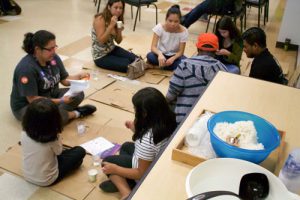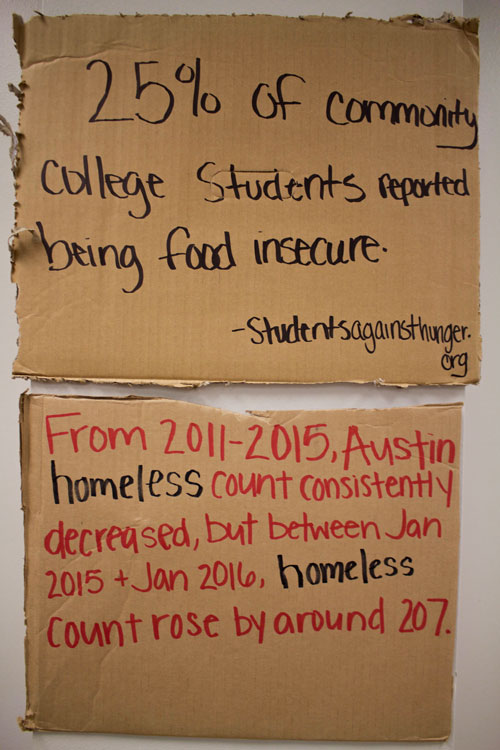[vc_row][vc_column][vc_column_text]
Written by Arleene Lozano
Video by Sam Douglas
Photos by Halie Davis

Hunger and Homelessness is a popular topic across the world. The United States alone is constantly struggling with this problem. There are 23,122 people experiencing homelessness on any given night in Texas, according to the 2016 Annual Homeless Assessment Report (AHAR). About 40 percent of the homeless in the U.S. are under the age of eighteen.
“I think it is getting harder [for students] to be self-sufficient,” Mass Communication major William Menjivar says. “Regardless of your income, whether you are at the 1 percent or not, I think at some point you are going to struggle. I think a lot of college students will sacrifice in the area of being able to eat so that they can provide in other ways, like having clothes on their back.”
Hunger and homelessness can derive from various factors in a person’s life like being born into poverty, being mentally or physically disabled, experiencing job loss, being incarcerated and more. People experiencing hunger and homelessness, may not have asked for this lifestyle but can’t seem to find the right help.
“When it comes to the topic of hunger and homelessness, I think that people are aware of it, however it becomes very easy to ignore,” Student Life Supervisor Kelly Brown says.
Throughout the city of Austin and its suburbs, it is unavoidably easy to spot someone on the side of the streets, and highways holding up signs and walking up and down the lines of cars stopped at a red light asking for some sort of help.
ACC recognizes the situation is difficult, so every year the Office of Student Life steps to raise awareness of hunger and homelessness. The Student Life Food Pantry program asked that each campus host a minimum of one program during the week of November 13-17, 2017.
The purpose and objective of this program derives from a statistic provided by the Wisconsin Hope Lab stating that “an estimated average of 13 percent of community college students may be homeless.”

With these statistics, ACC Student Life’s Hunger and Homelessness Awareness Week hopes to provide educational awareness to these problems. According to Office of Student Life, the objective of this week is to raise awareness regarding hunger and homelessness at ACC and the greater Austin area, educate the student body about these issues and build support for solutions. Plus, connect students with resources and encourage them to act and volunteer with Operation: Riverbats.
During this week, ACC campuses conducted events such as a sock drive, cardboard brigade, a hunger banquet and more.
“I think that everything ACC is doing, is definitely useful to the community,” says Menjivar. “It definitely raises awareness of how serious the situation is and I think it adds some humanity to it.”
Every year, the Office of Student Life hosts the OXFAM Hunger Banquet. Brown says, “Oxfam America is a global organization working to right the wrongs of poverty and hunger. The purpose and focus of the Oxfam Hunger Banquet is to bring awareness to global poverty, hunger, and the efforts that are being made to stop it. Essentially, we understand that everybody walks with a certain amount of privilege in life and we want everybody to recognize that and give them an opportunity to discuss it and the ways that they can help those that are suffering from food insecurity and housing insecurity.”
With the certainty that at least one classmate is food insecure, ACC Student Life offers a free service to its students, known as the Food Pantry. Every Student Life office has a food pantry full of canned and boxed, healthy foods for students experiencing food insecurity. Two in three community college students are food insecure, according to the Wisconsin Hope Lab. This affects many students on the ACC campuses.
“We see that here at Austin Community College, you see it pretty much at any two-year, four-year, higher education,” Brown says. “What we want to do here is educated students that there are opportunities for them to get food through food pantries popping up across the nation or through programs like Aunt Bertha.”
Other local and national organizations that Student Life connects students with are Give Pulse, Feeding America, Covenant House, Students Against Hunger, and Central Texas Food Bank.
Aunt Bertha is a search and referral platform that helps those facing social needs to find and make referrals to appropriate programs and services for food, shelter, health, care, work, financial assistance, and more, according to auntbertha.com. This website lists free and reduced cost service programs in every zip code. This platform currently has 1,853 programs serving people in Austin – some of which include the 31 food pantries they have listed.
Feeding America focuses on creating a nationwide network of member food banks to engage the nation in the fight to end hunger, according to feedingamerica.org. Feeding America is a U.S. based non-profit organization with more than 200 food banks that feed more than 46 million people through many food pantries, soup kitchens, shelters, and other community-based agencies.
According to covenanthouse.org, Covenant House offers housing and support services to young people in need, reaching nearly 80,000 boys and girls every year by saving the lives of homeless, runaway, and trafficked young people. Almost 40 percent of the homeless in the U.S. are under 18. In the U.S. alone, more than 20,000 kids are forced into prostitution by human trafficking networks every year. 10 to 50 percent of homeless youth engage in survival sex, or the exchange of sex for food, clothing, or shelter.
Central Texas Food Bank is the largest hunger-relief charity in Central Texas. They work with donors across the country, financial supporters and volunteers to fill unmet needs in Central Texas. They assist families who qualify for federal assistance programs, share free food and knowledge on low-cost, healthy eating with families in need, and make food affordable for charitable government partners. Their website helps people locate places nearby if they are ever in need of a meal.
“College students should care about the homeless because they are people, just like you, me and somebody that is just trying to get by,” Menjivar says. “Maybe at some point, they fell down on their luck and did not have the means to get back up so they had to humble themselves to the point of asking for help. If I were in the situation, I would want somebody to help me out so we should open up our hearts to helping other people.”
This is not to say that all community college students are struggling. For those who are not, there are multiple ways to get informed and involved to help others who are going through these daily struggles. “In the Austin population, where we do have a large homeless population, they almost become fixtures that we get used to and therefore it becomes easier and easier to pass it by,” Brown says.
Students have an array of options to choose from if needed and the Office of Student Life can direct someone seeking help in the right direction in order to prevent skipping a meal. Having so many cities and nation-wide resources available at any moment for the hungry and homeless is a great start ending the issue of hunger and homelessness.
Pick this story up in the Spring 2018 Life4U magazine on campus[/vc_column_text][/vc_column][/vc_row][vc_row][vc_column][vc_video link=”https://youtu.be/ajBV-skK4wk”][/vc_column][/vc_row]



